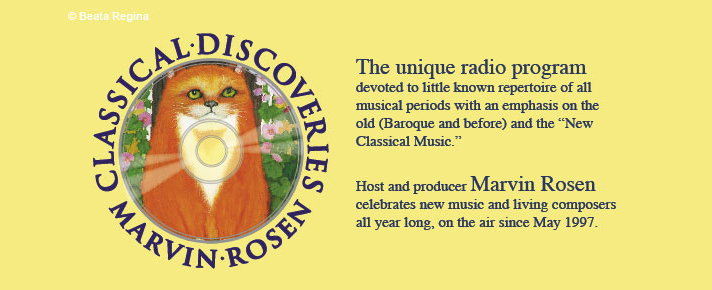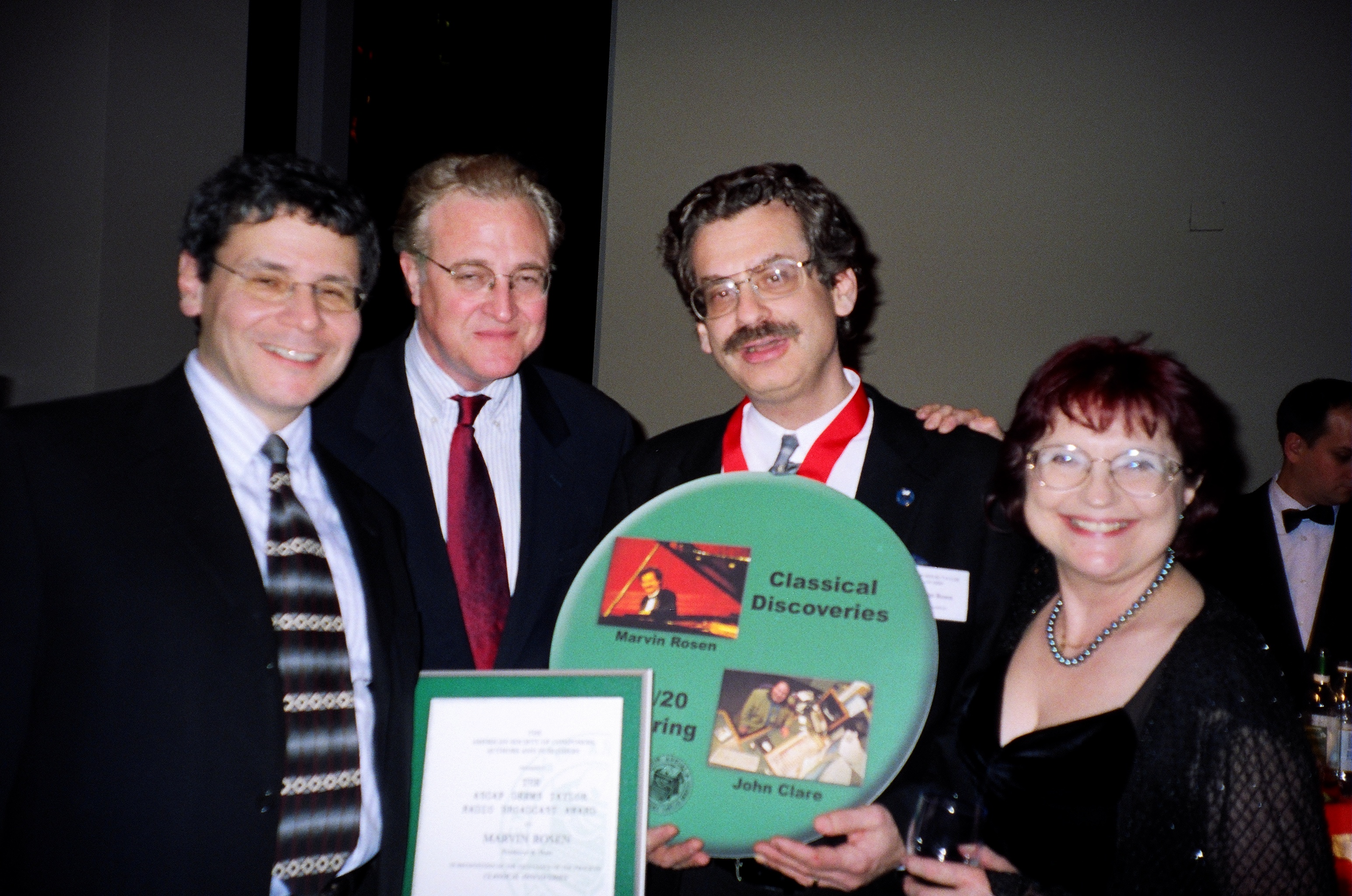ABOUT CLASSICAL DISCOVERIES WITH MARVIN ROSEN When Marvin Rosen was a child, he had a dream of both programming and hosting a radio show. Although the young Rosen loved television, he was far more attracted to radio. The future radio host was given his first transistor radio in December, 1962, and was immediately hooked - perhaps because the little radio was “his”. He could insert the earplug and be transported to his own world. That world was WABC in New York. Yes, it was a “Top 40” station but a most important one featuring the voices of Dan Ingram, Cousin Brucie, and other legendary announcers. Rosen became very interested in classical music in 1966. There was always great music playing in his home when he was growing up. In addition, he was taken to the “Young People’s Concerts” in New York City that featured Leonard Bernstein, who was probably the greatest inspiration to him and his love of serious music. In Rosen’s opinion, there will never be anyone like him again. He considers himself lucky to have grown up during this time. By the end of 1966, he started listening to classical radio and buying classical records. His favorite station was WQXR, which he listened to all the time. Rosen will never forget the great voices of Bill Strauss, Melvin Elliott, and others on that station. He later got hooked on WNCN and also to the “DeKoven Concert” featuring the wonderful baroque music aired by Seymour DeKoven, who to Rosen is still the most unique and interesting classical DJ ever to hit the airwaves. DeKoven was very enthusiastic and quite outspoken. Rosen owes his interest in baroque music to him. |
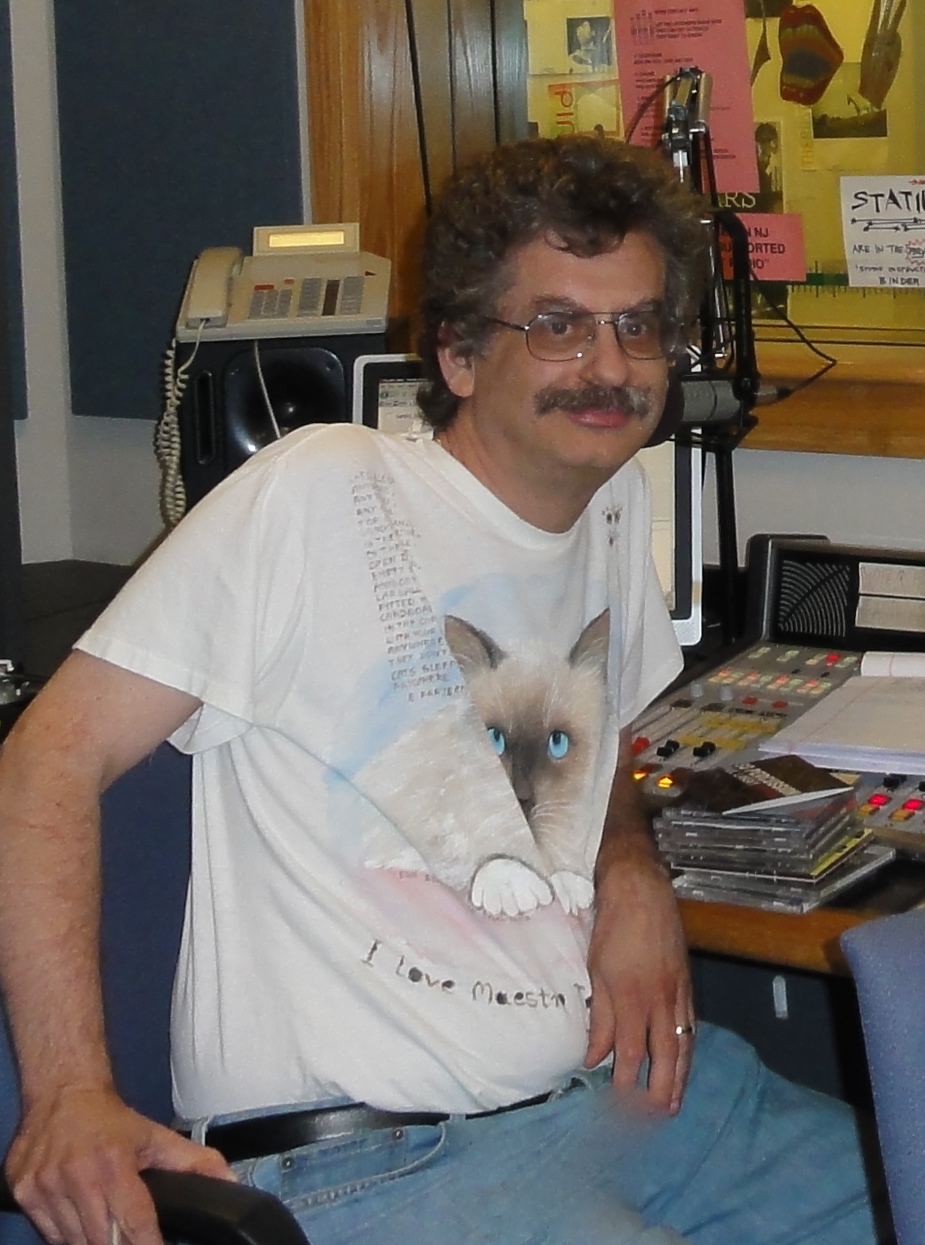 |
The dream of both programming and hosting a radio show began for Rosen in May of 1997, when there was an opening at WPRB in Princeton. Even though the position was that of a volunteer he enjoyed and still does every moment in both preparing and presenting the selections on the air. His first programs included a mix of more of the familiar than the unfamiliar and stayed that way for the show’s first months. The response to the program was very positive. Listeners especially liked the rarely heard early music and the selections of recent works. At the beginning of 1998, Rosen decided to play far less Nineteenth Century music since that was the strong point of other stations. “Classical Discoveries” then became a program featuring rarely heard selections from all periods with an emphasis on the very old and the very new. It is truly amazing how much worthwhile early and new music is available on compact disc that is rarely, if ever, played on other radio stations. If you are tired of the Bach Brandenburg Concertos, don’t worry; you will never hear them on this program. |
The presentation of much new music is an important feature of “Classical Discoveries”. Rosen is most concerned about the general feeling towards contemporary music. It appears that many concertgoers seem to feel that if a program contains the name especially of an unknown composer of the Twentieth or Twenty-First Centuries the music will most likely be unmelodic, dissonant, and simply not enjoyable for listening. Unless it is a standard piece of the repertoire, a Twentieth Century work often puts fear into an audience. Often the music won’t be given a chance. Rosen tries to prove on every show that there is much beautiful music of our time that deserves to be heard. Composers are working hard today. Their works deserve to be presented to the public. Listeners often tell him that they didn't know that new music could be so melodious and beautiful. Although he plays recent works by well-known composers, Rosen emphasizes the little-known ones that are recorded on the small record labels. He will periodically invite various composers to be guests on his program often for up to two and half hours as long as they have a substantial discography. Rosen tries to keep these meetings very informal with the main focus on a composers music, without being too technical, so the average listener gets to know both the composer and the music without intimidation. Sometimes a program will have a particular theme as, for example: "CLASSICAL DISCOVERIES GOES TO A MUSEUM" or "CLASSICAL DISCOVERIES GOES TO WASHINGTON - GHOSTS OF THE PAST". Other times the focus is on one country or region like: "FROM JAKARTA TO JAYAPURA", "FROM THE BALTIC SEA TO THE TATRA MOUNTAINS", "THE ORIENT UNVEILED", or the first ever in the western world program devoted to Azerbaijani music titled "THE LAND OF FIRE" and much more. Classical Discoveries devoted four 24-hour Live Marathons "VIVA 21-ST CENTURY” totally devoted to music that was just composed. The fourth Marathon was totally devoted to music recently written by women composers. From its beginning, Classical Discoveries presented many American and World premiere broadcasts as well many private recordings. All works were always presented in complete form regardless of length from two-hour long oratorios to six-hour long string quartets. You might hear beautiful Fourteenth Century sacred works, which might be deemed improper for other stations to broadcast, to works that have just been written. Early music has a very important part in Classical Discoveries programming, which is focused mostly on unknown or lesser know composers and works. In the summer of 2009, the show presented a special series of programs titled "TREASURES OF EARLY MUSIC." |
|
The programs also include more avant-garde and electronic works, usually in the later part of five-hour segments. Moreover, in the summer of 2008, the program started a new show "CLASSICAL DISCOVERIES GOES AVANT-GARDE" that became a very popular feature with WPRB listeners. This program focuses on electronic and more modern work. Occasionally, Classical Discoveries will be hosting other programs like "SUNDAY OPERA," "MUSICAL ODYSSEY," or “JAZZ.” The program’s large audience is now listening to new music and as a result is attending new music concerts. Those who were sick of Vivaldi are now enjoying early music at home and in concert halls, and contemporary composers are receiving performances and commissions after producers and choir directors hear their works during the program’s broadcast. |
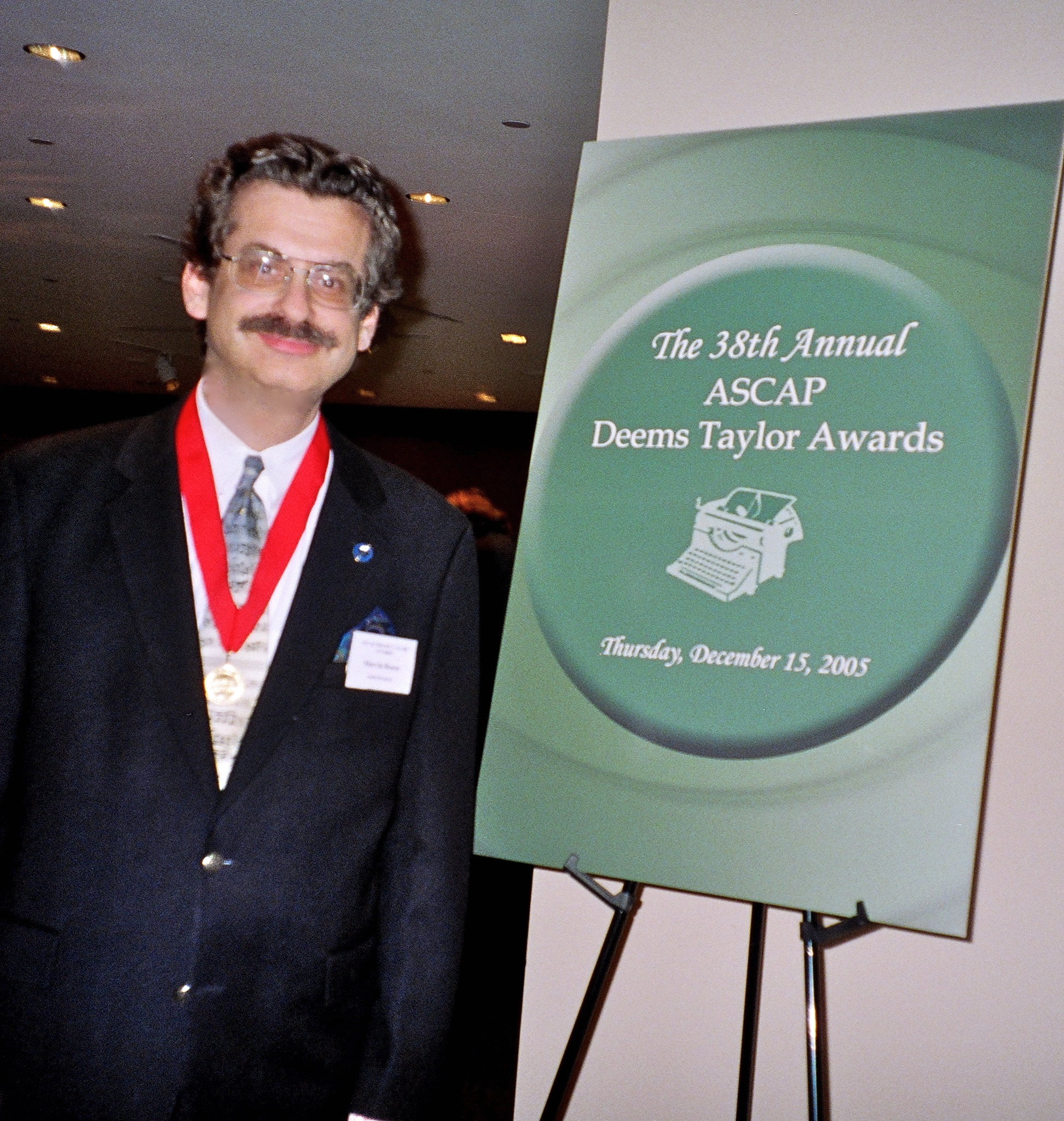 |
| In 2005 "Classical Discoveries" was awarded with the "ASCAP Deems Taylor Radio Broadcast Award " |
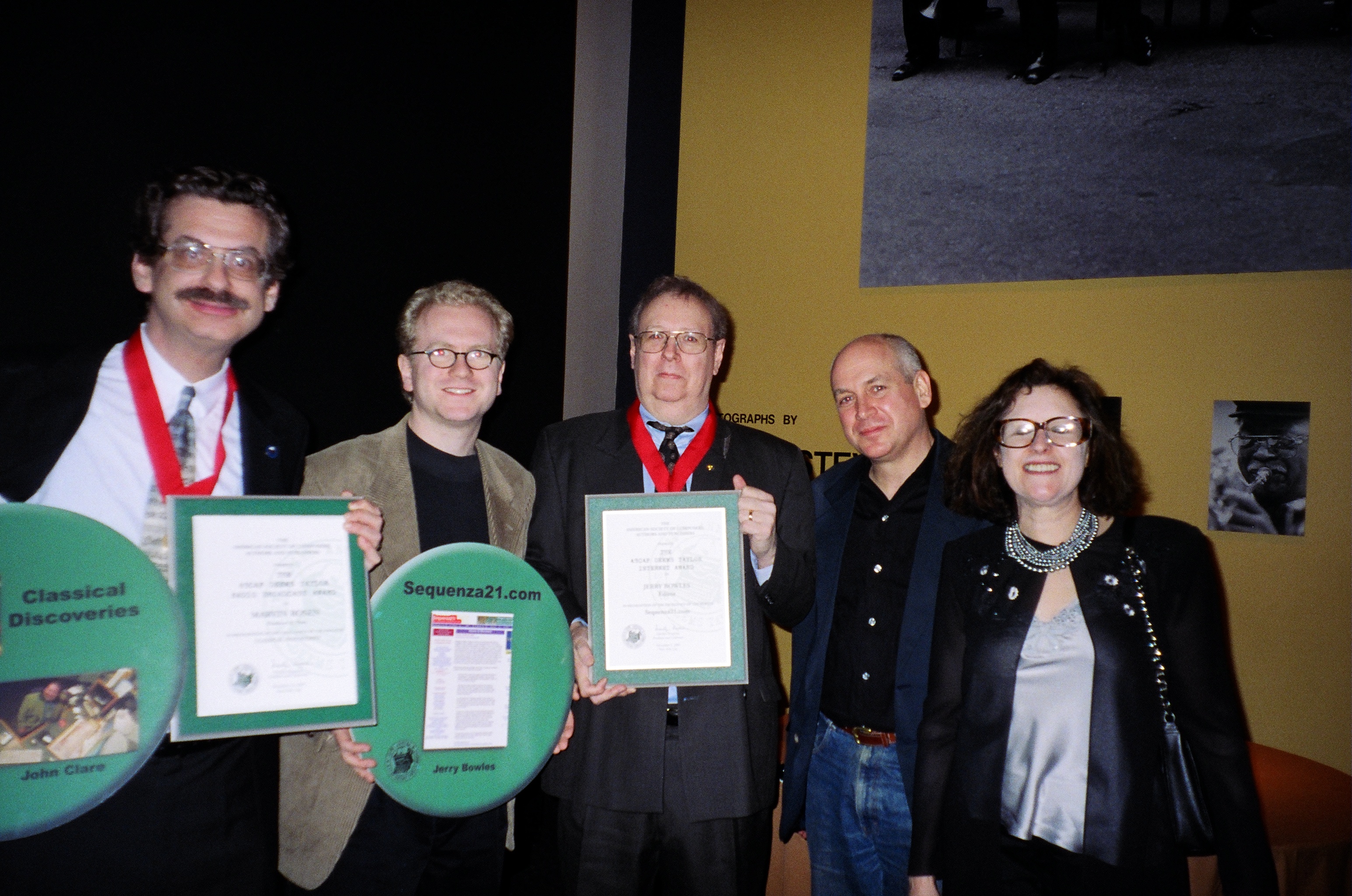 Marvin, ?, Paul Bowles, ?. Elodie Lauten
Marvin, ?, Paul Bowles, ?. Elodie Lauten
|
Revised by Frederick M. Herrmann, January 14, 2010


